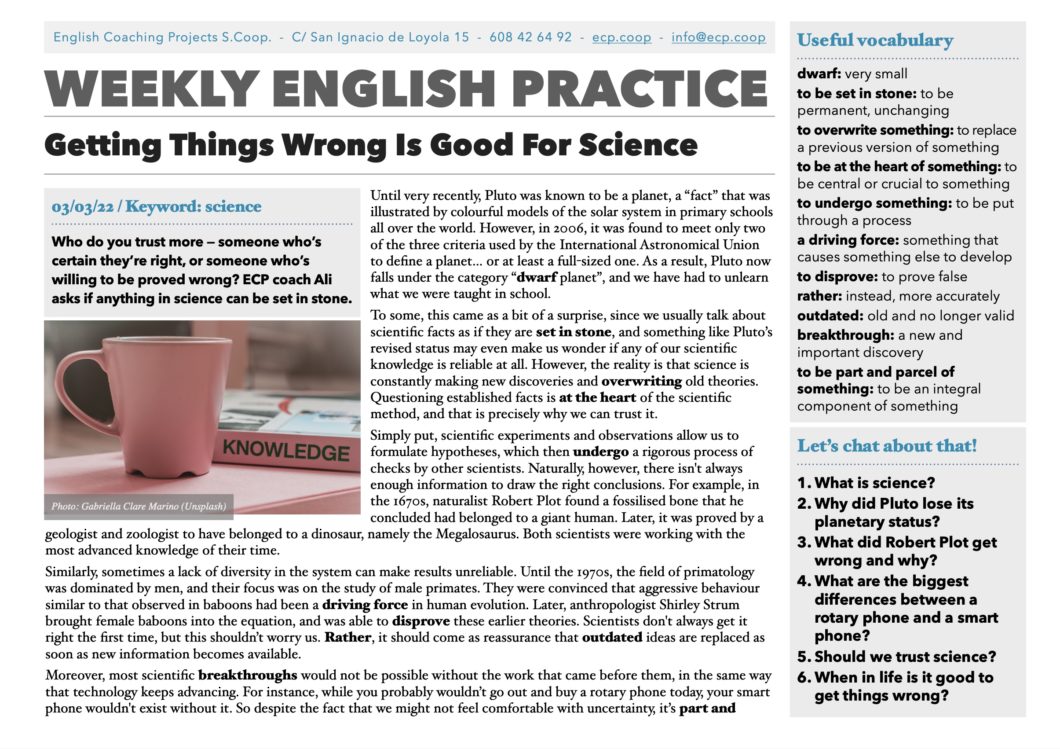Getting Things Wrong Is Good For Science
03/03/22 / Keyword: science
Who do you trust more — someone who’s certain they’re right, or someone who’s willing to be proved wrong? ECP coach Ali asks if anything in science can be set in stone.
Click HERE to download the Weekly English Practice as a PDF.
Useful vocabulary
dwarf: very small
to be set in stone: to be permanent, unchanging
to overwrite something: to replace a previous version of something
to be at the heart of something: to be central or crucial to something
to undergo something: to be put through a process
a driving force: something that causes something else to develop
to disprove: to prove false
rather: instead, more accurately
outdated: old and no longer valid
breakthrough: a new and important discovery
to be part and parcel of something: to be an integral component of something
Listen to the audio and read the text.
Who do you trust more — someone who’s certain they’re right, or someone who’s willing to be proved wrong? ECP coach Ali asks if anything in science can be set in stone.
Until very recently, Pluto was known to be a planet, a “fact” that was illustrated by colourful models of the solar system in primary schools all over the world. However, in 2006, it was found to meet only two of the three criteria used by the International Astronomical Union to define a planet… or at least a full-sized one. As a result, Pluto now falls under the category “dwarf planet”, and we have had to unlearn what we were taught in school.
To some, this came as a bit of a surprise, since we usually talk about scientific facts as if they are set in stone, and something like Pluto’s revised status may even make us wonder if any of our scientific knowledge is reliable at all. However, the reality is that science is constantly making new discoveries and overwriting old theories. Questioning established facts is at the heart of the scientific method, and that is precisely why we can trust it.
Simply put, scientific experiments and observations allow us to formulate hypotheses, which then undergo a rigorous process of checks by other scientists. Naturally, however, there isn’t always enough information to draw the right conclusions. For example, in the 1670s, naturalist Robert Plot found a fossilised bone that he concluded had belonged to a giant human. Later, it was proved by a geologist and zoologist to have belonged to a dinosaur, namely the Megalosaurus. Both scientists were working with the most advanced knowledge of their time.
Similarly, sometimes a lack of diversity in the system can make results unreliable. Until the 1970s, the field of primatology was dominated by men, and their focus was on the study of male primates. They were convinced that aggressive behaviour similar to that observed in baboons had been a driving force in human evolution. Later, anthropologist Shirley Strum brought female baboons into the equation, and was able to disprove these earlier theories. Scientists don’t always get it right the first time, but this shouldn’t worry us. Rather, it should come as reassurance that outdated ideas are replaced as soon as new information becomes available.
Moreover, most scientific breakthroughs would not be possible without the work that came before them, in the same way that technology keeps advancing. For instance, while you probably wouldn’t go out and buy a rotary phone today, your smart phone wouldn’t exist without it. So despite the fact that we might not feel comfortable with uncertainty, it’s part and parcel of the scientific process, and it’s what makes progress possible.
Adapted from this video by ECP coach Alison Keable
Let’s chat about science!
- What is science?
- Why did Pluto lose its planetary status?
- What did Robert Plot get wrong and why?
- What are the biggest differences between a rotary phone and a smart phone?
- Should we trust science?
- When in life is it good to get things wrong?
Take a moment to look at these related articles!
An Eggcorn Is a Funny Linguistic Error

